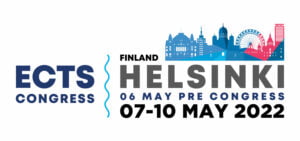 Despite having had a very successful virtual 2021 ECTS congress, I guess we are all longing for pre-Covid conditions by returning back to normal and be able to meet in person again. The Scientific Programme Committee of ECTS 2022 is optimistic that we can achieve just that: physically interact with each other at the upcoming 49th annual ECTS congress in Helsinki, Finland!
Despite having had a very successful virtual 2021 ECTS congress, I guess we are all longing for pre-Covid conditions by returning back to normal and be able to meet in person again. The Scientific Programme Committee of ECTS 2022 is optimistic that we can achieve just that: physically interact with each other at the upcoming 49th annual ECTS congress in Helsinki, Finland!
Over the last year, preparations have been made to generate an exciting and diverse scientific programme containing many different topics within the musculoskeletal field that will stimulate basic/translational scientists, clinical research and allied health professionals to gather knowledge and foster new collaborations.
As the basic co-chair, I am excited to introduce to you the basic/translational aspects of the main programme. I have no doubt that the diversity and novelty of the topics should appeal to all basic and translational scientists. There are 3 basic symposia scheduled, one for each day of the main meeting. The first one is a joint session with the CABS on advances in Osteosarcoma. More specifically, new molecular mechanisms underlying and immunotherapy for osteosarcoma will be highlighted. The second concurrent symposium will address novel concepts for osteoclast biology, when do they form pits versus trenches/trails and what is their role in angiogenesis and senescence? The third symposium will focus on mechanobiology. The topics will include the contribution of mechanobiology in fracture resistance and the role of piezo channels in the skeleton.
In order to stimulate multidisciplinary research in the musculoskeletal field by bringing basic and clinical researchers together, ECTS annually organizes several symposia consisting of one basic and one clinical keynote speaker on a single topic. The programme has 4 fascinating symposia in store for all of us to enjoy. Firstly, the What-is-New symposium on chronobiology, clock genes and their relevance to musculoskeletal health. This will include circadian rhythm, exercise and metabolic diseases but also metabolic and skeletal consequences of sleep disturbance. The second symposium, – from insights to outside -, typically familiarizes us with a technology or concept that is new to the field. This year we introduce organ-on chip technology as a new tool for bone. Keynote lectures will introduce angiogenesis-on-a-chip and bone-related cancer chip models. The third symposium will focus on cranial defects and repair, where we will have speakers discussing human genetics of craniosynostosis and bioactive implants for the correction of craniofacial defects. The fourth symposium will address the genetics and epidemiology of bone strength and fracture risk, involving pathophysiology to polygenic risk scores as well as biobanking of large cohorts.
For the first time in 2022 and in analogy to the annual big clinical debate and the big clinical science session we have now organized the Basic Science Debate and the Big Basic Science Session. The debate will deal with a currently relevant topic being the use of conditional knockout models versus human 3D cell models. We expect a lively debate as all basic and translational scientists will have opinions about one or both of the approaches. The first Big Basic Science Session will address circulating osteogenic precursors in relation to skeletal biology but also liquid biopsies in relation to cancers, including those disseminating to bone.
These scientific highlights encompass the core of the basic main programme with the highlights of the clinical programme brought to you soon. But this is not all: we are currently finalizing the ancillary programme which also comprises a wide range of musculoskeletal research topics. We will have open forums (formerly known as working groups) on the premeeting day and various workshops, both of which are affiliating with other societies, including ASBMR, IFMRS, ISBM, CABS, FISHBONE, CKD-MBD and BMAS. moreover, there will be the basic and technological updates, the East-meets-West workshop, Meet- the Expert sessions, ECTS Academy sessions, and much more.
All in all, we believe we have composed an exciting programme to suit all of you that should allow for an excellent and successful 2022 annual meeting. We sincerely hope that we can leave Covid-19 behind and be able to travel next May. We anticipate on meeting you all in Helsinki!
